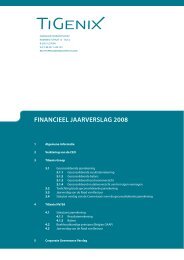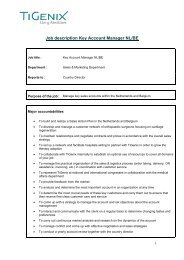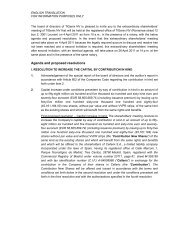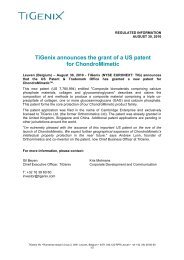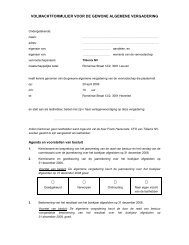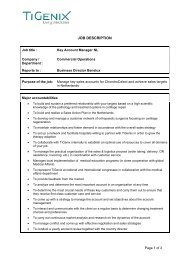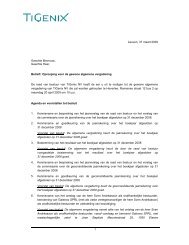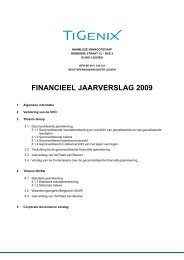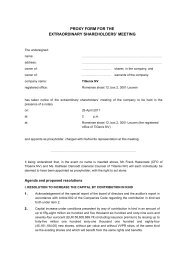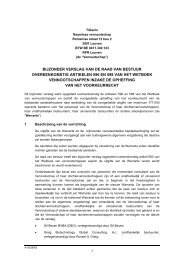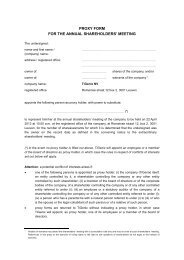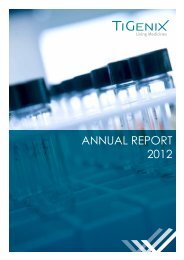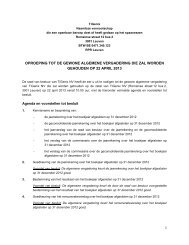ANNUAL FINANCIAL REPORT 2010 2010 - TiGenix
ANNUAL FINANCIAL REPORT 2010 2010 - TiGenix
ANNUAL FINANCIAL REPORT 2010 2010 - TiGenix
- No tags were found...
Create successful ePaper yourself
Turn your PDF publications into a flip-book with our unique Google optimized e-Paper software.
The minutes must also contain a justification by the board forthe decision or transaction, and a description of the financialconsequences thereof for the Company. The relevant minutesmust be included in the (statutory) annual report of the Boardof Directors. The conflicted director must also notify thestatutory auditor of the conflict. The statutory auditor mustdescribe in his annual (statutory) audit report the financialconsequences of the decision or transaction that gave rise tothe potential conflict.In case of non-compliance with the foregoing, the Companymay request the annulment of the decision or the transactionswhich have taken place in breach of these provisions if thecounterparty to the decision or the transaction was, or shouldhave been, aware of such breach.The procedure does not apply to decisions or transactions inthe ordinary course of business at customary market conditions.It also does not apply to transactions or decisions betweencompanies of which one holds (directly or indirectly) at least95% of the voting financial instruments of the other, andtransactions or decisions between companies whereby at least95% of the voting financial instruments of both companies are(directly or indirectly) held by another company.Article 524ter of the Companies Code provides for a similarprocedure in the event of conflicts of interest of executivecommittee members. In the event of such conflict, only theBoard of Directors will be authorised to take the decision thathas led to the conflict of interest. The Company’s executivemanagement team does not qualify as an executive committeein the sense of Article 524bis of the Companies Code.Currently, the directors do not have a conflict of interest withinthe meaning of Article 523 of the Companies Code that has notbeen disclosed to the Board of Directors.assess the business advantages and disadvantages of thedecision or transaction for the Company. It must quantify thefinancial consequences thereof and must determine whetheror not the decision or transaction causes a disadvantage tothe Company that is manifestly illegitimate in view of theCompany’s policy. If the committee determines that thedecision or transaction is not manifestly illegitimate, but is ofthe opinion that it will prejudice the Company, it must clarifywhich advantages are taken into account in the decisionor transaction to compensate the disadvantages. All theseelements must be set out in the committee’s advice. The Boardof Directors must then take a decision, taking into account theopinion of the committee.Any deviation from the committee’s advice must be motivated.Directors who have a conflict of interest are not entitledto participate in the deliberation and vote (as set out insection 5.9.2 above). The committee’s advice and the decisionof the Board of Directors must be notified to the Company’sstatutory auditor, who must render a separate opinion. Theconclusion of the committee, an excerpt from the minutes ofthe Board of Directors and the opinion by the statutory auditormust be included in the (statutory) annual report of the Boardof Directors.The procedure does not apply to decisions or transactions inthe ordinary course of business at customary market conditions,and transactions or decisions with a value of less than 1% of theconsolidated net assets of the Company.Apart from the foregoing procedure, the Company must alsoreport in its annual report substantial restrictions or burdensimposed or maintained by the controlling parent company ifany, during the previous financial year.5.9.3 Transactions with affiliatesArticle 524 of the Companies Code provides for a specialprocedure that applies to intra-group or related partytransactions with affiliates. The procedure applies to decisionsor transactions between the Company and affiliates of theCompany that are not a subsidiary of the Company. It alsoapplies to decisions or transactions between any of theCompany’s subsidiaries and such subsidiaries’ affiliates that arenot a subsidiary of the Company. Prior to any such decisionor transaction, the Board of Directors must appoint a specialcommittee consisting of three independent directors, assistedby one or more independent experts. This committee must102 • <strong>TiGenix</strong> • Rights Offering



